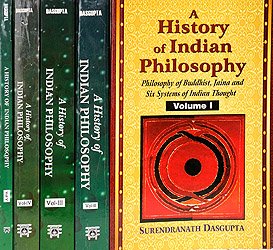A History of Indian Philosophy Volume 4
Indian Pluralism
by Surendranath Dasgupta | 1949 | 186,278 words | ISBN-13: 9788120804081
This page describes the philosophy of god and his powers: a concept having historical value dating from ancient India. This is the third part in the series called the “the philosophy of jiva gosvami and baladeva vidyabhushana”, originally composed by Surendranath Dasgupta in the early 20th century.
Part 3 - God and His Powers
Returning to the Ṣaṭ-sandarbha, one stumbles over the problem how the Brahman, who is pure consciousness and unchangeable, can be associated with the ordinary guṇas of prakṛti. The ordinary analogy of play cannot apply to God; children find pleasure in play or are persuaded to play by their playmates; but God is selfrealized in Himself and His powers, He cannot be persuaded to act by anybody, He is always dissociated from everything, and is not swayed by passions of any kind. As He is above the guṇas, they and their actions cannot be associated with Him. We may also ask how the jīva, who is identical with God, can be associated with the beginningless avidyā. He being of the nature of pure consciousness, there ought not to be any obscuration of His consciousness, either through time or through space or through conditions or through any internal or external cause. Moreover, since God exists in the form of the jīvas in all bodies, the jīvas ought not to be under the bondage of afflictions or kartna . The solution of such difficulties is to be found in the supra-rational nature of the māyā-śakti of God, which, being supra-logical, cannot be dealt with by the apparatus of ordinary logic. The fact that the power of God can be conceived as internal (antaraṅga) and external (bahiraṅga) explains why what happens in the region of God’s external power cannot affect His own internal nature; thus, though God in the form of jīvas may be under the influence of māyā and the world-experience arising therefrom, He remains all the time unaffected in His own internal nature. The supra-logical and supra-rational distinction existing between the threefold powers (svarūpa or antaraṅga, bahiraṅga, and taṭastha) of God and their relation to Him explains difficulties which ordinarily may appear insurmountable. It is this supra-logical conception that explains how God can be within the sway of māyā and yet be its controller[1]. The jīva in reality is not under the sway of afflictions, but still he appears to be so through the influence of God’s māyā; just as in dreams a man may have all kinds of untrue and distorted experiences, so also the world-experiences are imposed on the self through the influence of God’s māyā. The appearance of impurity in the pure jīva is due to the influence of māyā acting as its upādhi (or condition)—just as the motionless moon appears to be moving on the ripples of a flowing river. Through the influence of māyā the individual jīva identifies himself with the prakṛti and falsely regards the qualities of the prakṛti as his own[2].
Footnotes and references:
[1]:
Ṣaṭ-sandarbha, p. 270.
[2]:
yathā jale pratibimbitasya eva candramaso jalopadhikṛtaḥ kampādi-guṇo dharmo dṛśyate na tvākāśa-sthitasya tadvad anātmanaḥ prakṛti-rūpopādher dharmaḥ ātmanaḥ śuddhasyāsann api aham eva so’yam ity āveśān māyayā upadhi-tādātmyāpannāhaṃkārābhāsasya pratibimba-sthānīyasya tasya draṣṭur ādhyātmikāvasthasya eva yady api syāt tathāpi śuddhaḥ asau tad-abhedābhimānena taṃ paśyati.
Ibid. p. 272.
